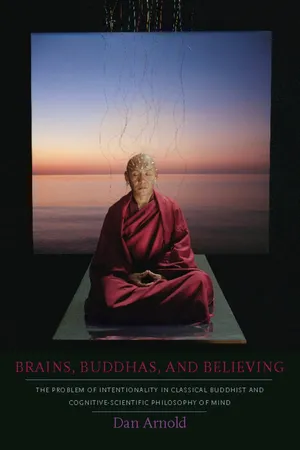
Brains, Buddhas, and Believing
The Problem of Intentionality in Classical Buddhist and Cognitive-Scientific Philosophy of Mind
- English
- ePUB (mobile friendly)
- Available on iOS & Android
Brains, Buddhas, and Believing
The Problem of Intentionality in Classical Buddhist and Cognitive-Scientific Philosophy of Mind
About This Book
Premodern Buddhists are sometimes characterized as veritable "mind scientists" whose insights anticipate modern research on the brain and mind. Aiming to complicate this story, Dan Arnold confronts a significant obstacle to popular attempts at harmonizing classical Buddhist and modern scientific thought: since most Indian Buddhists held that the mental continuum is uninterrupted by death (its continuity is what Buddhists mean by "rebirth"), they would have no truck with the idea that everything about the mental can be explained in terms of brain events. Nevertheless, a predominant stream of Indian Buddhist thought, associated with the seventh-century thinker Dharmakirti, turns out to be vulnerable to arguments modern philosophers have leveled against physicalism.
By characterizing the philosophical problems commonly faced by Dharmakirti and contemporary philosophers such as Jerry Fodor and Daniel Dennett, Arnold seeks to advance an understanding of both first-millennium Indian arguments and contemporary debates on the philosophy of mind. The issues center on what modern philosophers have called intentionality —the fact that the mind can be about (or represent or mean) other things. Tracing an account of intentionality through Kant, Wilfrid Sellars, and John McDowell, Arnold argues that intentionality cannot, in principle, be explained in causal terms.
Elaborating some of Dharmakirti's central commitments (chiefly his apoha theory of meaning and his account of self-awareness), Arnold shows that despite his concern to refute physicalism, Dharmakirti's causal explanations of the mental mean that modern arguments from intentionality cut as much against his project as they do against physicalist philosophies of mind. This is evident in the arguments of some of Dharmakirti's contemporaneous Indian critics (proponents of the orthodox Brahmanical Mimasa school as well as fellow Buddhists from the Madhyamaka school of thought), whose critiques exemplify the same logic as modern arguments from intentionality. Elaborating these various strands of thought, Arnold shows that seemingly arcane arguments among first-millennium Indian thinkers can illuminate matters still very much at the heart of contemporary philosophy.
Frequently asked questions
Information
Table of contents
- Cover
- Half title
- Title
- Copyright
- Epigraph
- Contents
- Acknowledgments
- Introduction
- 1. Dharmakīrti’s Proof of Rebirth: A Dualist Account of the Causes of Cognition
- 2. The Cognitive-Scientific Revolution: Computationalism and the Problem of Mental Causation
- 3. Responsiveness to Reasons as Such: A Kantian Account of Intentionality
- 4. The Apoha Doctrine: Dharmakīrti’s Account of Mental Content
- 5. The Svasamvitti Doctrine: Dharmakīrti’s “Methodological Solipsism”
- 6. Indian Arguments from Practical Reason: Mīmāmsakas and Mādhyamikas Contra Cognitivism
- Concluding Reflections: Religious Studies and Philosophy of Mind
- Notes
- References
- Index